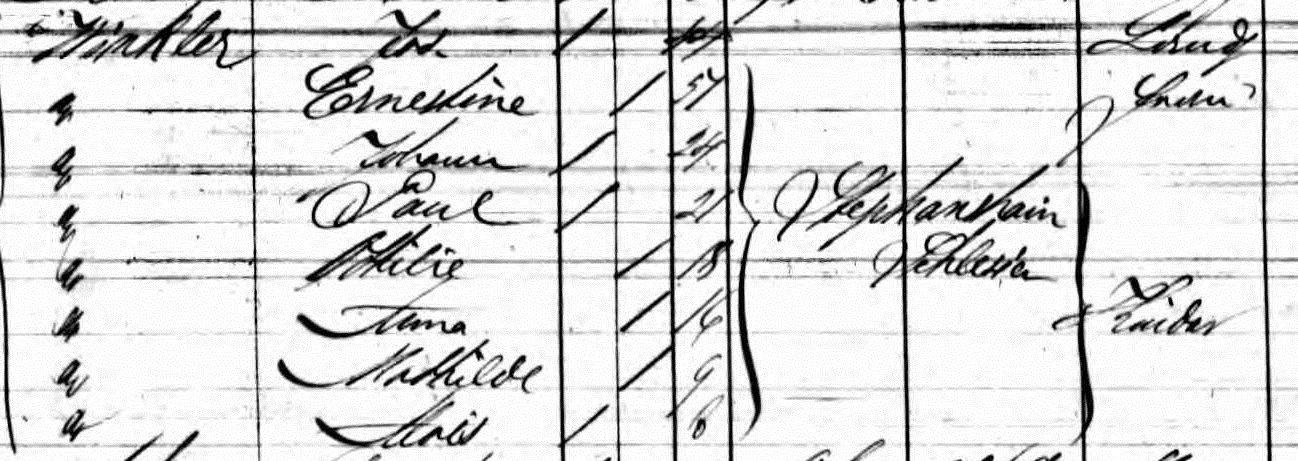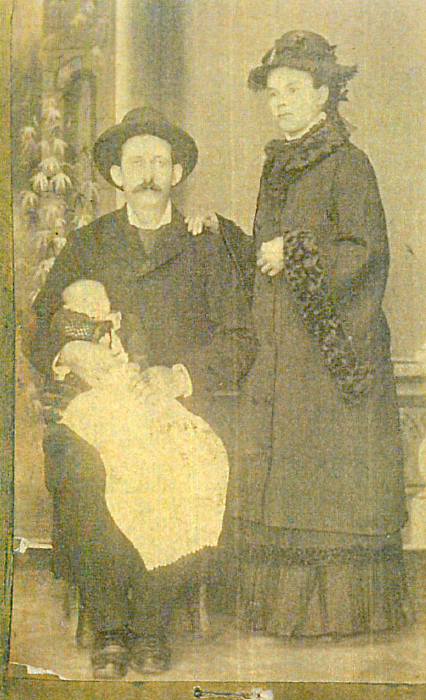Last time we learned about Annie Rademacher’s father, Joseph Burkey. Joseph was a young Mennonite man living in Crete, Nebraska in the early 1880’s. How in the world did the Rademacher family tree – almost entirely Catholic – end up with a Mennonite branch?
Let’s look first at the woman Joseph Burkey would eventually marry: Ottilia Winkler.
Ottilia was born in 1859 in a region that is now part of Poland, but has gone back and forth between Prussia, Germany and Poland through the centuries. I’ve been unable to find church records for Ottilia, though I intend to do some more digging someday. The first record we find for her is the ship’s passenger list for the S. S. Wieland that left Hamburg, Germany on June 14, 1876.

Here we see an entire Winkler family: parents Joseph and Ernestine, children Johann, Paul, Ottilie, Anna, Mathilde and Alois. The children range in age from 8 to 24. Ottilia (or Ottilie, as it was spelled in the old country) was 18 years old.
Some stories about Ottilia have been passed down through the family, through Sister Marie Gerard (one of Ottilia’s grand-daughters). Here are a few of them:
- Her father Joseph was a landscape gardener on a fancy estate in Silesia. They lived on the estate in the gardener’s cottage, which had walls “a yard thick”. The house was warm in the winter and cool in the summer. The children helped tend the geese on the estate.
- One of Ottilia’s brothers was about to be drafted into the army. When they came to collect him, he pretended to be “mentally deficient” and the officers left without him. The family was very scared for his future and that is when the decided to emigrate. They bought some land, sight unseen, in Crete, Nebraska.
- Ottilia always remembered the day they left home. As they were leaving, they came to the top of a hill where they looked back and saw their grandmother waving good-bye. They never saw her again. She also had to leave behind a favorite pet dog, who had a tail “curled up like a cinnamon bun.”
- The land agent who sold them the land turned out to be a crook. When they got to Nebraska, the house was full of lice and bugs and they had to sleep in a wagon.
- To make ends meet, all the kids had to get jobs. Ottilia worked at a restaurant in Crete. One of the cooks handed her a plate of corn on the cob. The only corn Ottilia had ever seen was used for livestock, so she threw the corn out the back door for the pigs to eat. The cook got mad at her because the corn was for people, not animals!
I guess things weren’t going so well for Ottilia in the restaurant. Their local priest recommended her for a job as a housekeeper for an old Mennonite couple who still had a son at home. From the “Albrechts 1836-1986” family history book:
She found the Burkeys were kind and loving parents who led an upright life. Each evening the father would read from the Bible for the whole household. Their son, Joseph, became “interested” in Ottilia, but this posed a problem. She was a Catholic and she knew Joseph could not marry her because of the religious difference. So she decided she must leave, and she went to work at a shop in Crete. The story handed down in the family tells that in the winter Joseph was on a hunting trip and fell through the ice on the river and very nearly drowned. When his father pulled him out, Joseph said, “You might as well have let me die, for I can’t marry the one I love.” His father was very touched by this and reluctantly gave his consent, because the parents wanted Joseph to be happy. His parents also believed that he should choose freely to follow the Mennonite religion and way of life.
Meanwhile, Ottilia sought the advice of the local Priest. He asked Ottilia how Joseph treated his parents. When Ottilia said he was a good and respectful son, the Priest said, “Good, that is how he will treat you, too” and gave permission for her to marry the young Mennonite man. Within three weeks he converted to the Catholic faith and they were married on May 23, 1882.
Here’s the happy couple several months later with their newborn son Aloys (and remember, in the days before flash photography you had to keep a still and serious face when you posed for pictures):

